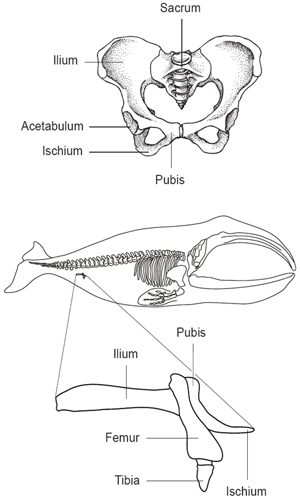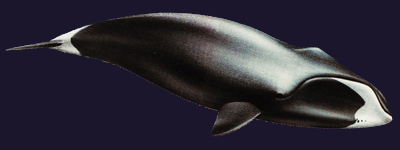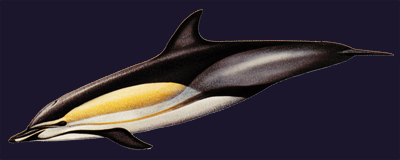|
Read more about pelvic development in whales here >>>
Toothed whales and baleen whales have several marked skeletal differences. In addition to the lack of teeth, baleen whales often have a relatively large head with broad, bowed lower jaws. The jaws of toothed whales are more slender and straight. Baleen whales also lack a breast bone (sternum), most of them (not the right whales) have only four fingers in contrast to the five fingers of toothed whales, and they have a pelvic girdle of different shape.
The reduced pelvis of whales
The highly rudimentary hind limbs are typical skeletal traits for all modern whales. During the early development, whale embryos show rudiments of hind limbs just like other mammals. This was described in detail by Professor Gustav Guldberg who examined the anatomy of whale embryos in the late 19th century. Some of his work was based on the collections at the Natural History Museum in Bergen.
In fully grown individuals of all modern whales, the hind limbs are totally hidden within the body cavity. In contrast to other mammals, the pelvic girdle is not attached to the vertebral column, but lies separately on its ventral side.

A comparison of the innominate of humans and whales
The human innominate (top) is attached to the Sacrum as in most other
mammals. Whales deviate from this pattern by having their innominates fully
separated from the vertebrate column. This is clear from the drawing of a
Bowhead whale skeleton shown here (centre). Also note the different parts of
the whale innominate (below). In Bowheads, the innominate is clearly divided
in ischium, ilium and pubis. In addition, an Acetabulum is present where the
femur and tibia are attached. Both these bones are particularly well
developed in this species compared with other whales.
Figures after Abel 1907 and Kardong 1995: Vertebrates. Comparative anatomy,
function, evolution. WCB Communications Inc. Dubuque.
Read more about pelvic development in whales here >>>
|



